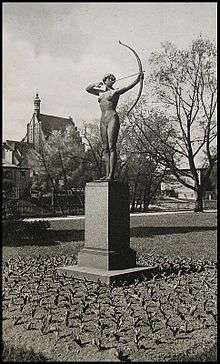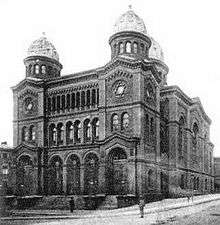Lewin Louis Aronsohn
Lewin Louis Aronsohn (18 October 1850 – 1928) was a German banker and liberal politician, a member of the regional parliament of the Province of Posen (Poznań), the Prussian House of Representatives and the Prussian Constitutional Assembly.
Lewin Louis Aronsohn | |
|---|---|
 Louis Aronsohn | |
| Member of the town council of Bromberg | |
| In office 1878–1890 | |
| Member of the magistrate of Bromberg | |
| In office 1890–1918 | |
| Member of the Landtag of the Province of Posen | |
| Member of the Prussian House of Representatives | |
| In office 1903–1918 | |
| Constituency | Wirsitz (Wyrzysk) – Bromberg, town and district (Bydgoszcz) |
| Prussian Constitutional Assembly | |
| In office 1919–1921 | |
| Personal details | |
| Born | 18 October 1850 Wissek, Prussian Province of Posen (Wysoka, Poland) |
| Died | 1928 (aged 77–78) Berlin, Weimar Germany |
| Political party | Free-minded People's Party (Germany) Progressive People's Party (Germany) German Democratic Party |
| Occupation | banker |
Aronsohn was born in Wissek, Prussian Province of Posen (Wysoka, Poland), he moved to Bromberg (Bydgoszcz), where he co-founded the Bromberg Ship Towing Society and the M. Stadthagen Bank. He became a municipal councillor (1878–1890), member of the magistrate of Bromberg (1890–1918) and headed the Jewish community from 1881 on. He initiated the construction of the new Synagogue. Aronsohn was elected a member of the regional Parliament of the Province of Posen.[1][2]
In 1903 he was elected a member of the Prussian House of Representatives for the Free-minded People’s Party, he later joined the Progressive People's Party.[3] He criticized the policy of the Prussian Settlement Commission, which bought Polish estates in the Provinces of Posen and West Prussia because this, from his point of view, provided Poles the financial means to settle in towns. In April 1914 he unsuccessfully suggested to use a restrictive clause for the government aid of home ownership in order to exclude Poles from the funding.[4][5]
He was a member and last president (1915-1918) of the Bromberg Chamber of Commerce. In the first decade of the 20th century he supervised a number of important infrastructural projects and controlled the municipal tax administration, gasworks, market, slaughterhouse, water tower, locks, and real estate market. He was responsible for the construction of a modern storage and industrial district at the lower Brahe (Brda). He was a member of the Riflemen’s Association, the Historical Society of the Netze District, and the German Society of Arts and Sciences. Aronsohn financed the Kaiser Wilhelm I monument[6] and the Archer, a sculpture which he unveiled on his 60th birthday and has become one of the symbols of Bydgoszcz.[1][7]
From 1915 on Aronsohn worked in the administration of German-occupied Poland. Aronsohn moved to Berlin in 1918, he opposed the incorporation of Bromberg into Poland. In 1919, he became a member of the Prussian Constitutional Assembly for the German Democratic Party.[1]
Aronsohn died in 1928 in Berlin. Today the Villa Aronsohn is the seat of the Municipal Housing Administration in Bydgoszcz.[1]
Awards
- Order of the Red Eagle Fourth Class (1902)[1]
- Order of the Crown (Prussia) Third Class (1912)[1]
- Honorary Citizen of Bromberg (1918)[8]
Gallery
 The Archer (1920)
The Archer (1920)- The Archer (modern view)
.jpg) Monument to Kaiser Wilhelm I (destroyed)
Monument to Kaiser Wilhelm I (destroyed) Villa Aronsohn in Bromberg
Villa Aronsohn in Bromberg Bromberg Synagogue
Bromberg Synagogue
References
- "Lewin Louis Aronsohn". sztetl.org.
- "Po bydgoskiej synagodze zostało niewiele" (in Polish). Tygodnik Bydgoski. 22 July 2017.
- Mann, Bernhard; Doerry, Martin; Rauh, Cornelia; Kühne, Thomas (1988). Biographisches Handbuch für das Preußische Abgeordnetenhaus (Handbücher zur Geschichte des Parlamentarismus und der politischen Parteien, Band 3) (in German). Düsseldorf: Droste Verlag. p. 50. ISBN 3-7700-5146-7.
- Hamburger, Ernest (1968). Juden im öffentlichen Leben Deutschlands: Regierungsmitglieder, Beamte und Parlamentarier in der monarchischen Zeit 1846-1918 (in German). Tübingen: Leo Baeck Institute. p. 373. ISBN 3-1682-9292-3.
- Wenzel, Stefi (1967). Jüdische Bürger und kommunale Selbstverwaltung in preußischen Städten 1808-1848 (in German). Berlin: Friedrich Meinicke Institut der Freien Universität Berlin. p. 170.
- Dyroff, Stefan (2007). Erinnerungskultur im deutsch-polnischen Kontaktbereich: Bromberg und der Nordosten der Provinz Posen (Wojewodschaft Poznan) 1871-1939 (in German). Fibre. p. 278. ISBN 978-3938400203.
- "Skulptur der Bogenschützin" (in German). visitbydgoszcz.pl.
- "Honorowi Obywatele Bydgoszczy" (in Polish). bydgoszcz.pl.